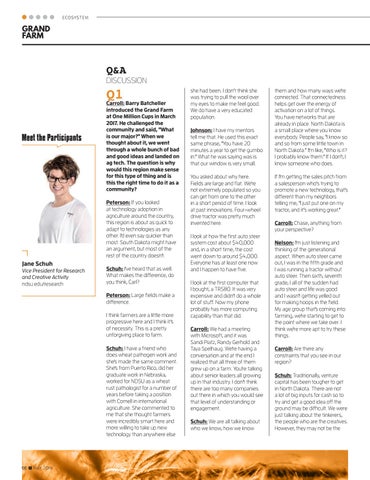EC O SYS T E M
GRAND FARM
Q&A
DISCUSSION
Q1 Meet the Participants
Carroll: Barry Batcheller introduced the Grand Farm at One Million Cups in March 2017. He challenged the community and said, "What is our major?" When we thought about it, we went through a whole bunch of bad and good ideas and landed on ag tech. The question is why would this region make sense for this type of thing and is this the right time to do it as a community? Peterson: If you looked at technology adoption in agriculture around the country, this region is about as quick to adapt to technologies as any other. I'd even say quicker than most. South Dakota might have an argument, but most of the rest of the country doesn't.
Jane Schuh Vice President for Research and Creative Activity ndsu.edu/research
Schuh: I've heard that as well. What makes the difference, do you think, Carl? Peterson: Large fields make a difference. I think farmers are a little more progressive here and I think it's of necessity. This is a pretty unforgiving place to farm. Schuh: I have a friend who does wheat pathogen work and she's made the same comment. She's from Puerto Rico, did her graduate work in Nebraska, worked for NDSU as a wheat rust pathologist for a number of years before taking a position with Cornell in international agriculture. She commented to me that she thought farmers were incredibly smart here and more willing to take up new technology than anywhere else
66
MAY 2019
she had been. I don’t think she was trying to pull the wool over my eyes to make me feel good. We do have a very educated population. Johnson: I have my mentors tell me that. He used this exact same phrase, "You have 20 minutes a year to get the gumbo in." What he was saying was is that our window is very small. You asked about why here. Fields are large and flat. We're not extremely populated so you can get from one to the other in a short period of time. I look at past innovations. Four-wheel drive tractor was pretty much invented here. I look at how the first auto steer system cost about $40,000 and, in a short time, the cost went down to around $4,000. Everyone has at least one now and I happen to have five. I look at the first computer that I bought, a TRS80. It was very expensive and didn't do a whole lot of stuff. Now my phone probably has more computing capability than that did. Carroll: We had a meeting with Microsoft, and it was Sandi Piatz, Randy Gerhold and Taya Spelhaug. We're having a conversation and at the end I realized that all three of them grew up on a farm. You're talking about senior leaders all growing up in that industry. I don't think there are too many companies out there in which you would see that level of understanding or engagement. Schuh: We are all talking about who we know, how we know
them and how many ways we're connected. That connectedness helps get over the energy of activation on a lot of things. You have networks that are already in place. North Dakota is a small place where you know everybody. People say, "I know so and so from some little town in North Dakota.” I'm like, "Who is it? I probably know them." If I don't, I know someone who does. If I'm getting the sales pitch from a salesperson who’s trying to promote a new technology, that's different than my neighbors telling me, "I just put one on my tractor, and it’s working great." Carroll: Chase, anything from your perspective? Nelson: I'm just listening and thinking of the generational aspect. When auto steer came out, I was in the fifth grade and I was running a tractor without auto steer. Then sixth, seventh grade, I all of the sudden had auto steer and life was good and I wasn't getting yelled out for making hoops in the field. My age group that's coming into farming, we're starting to get to the point where we take over. I think we're more apt to try these things. Carroll: Are there any constraints that you see in our region? Schuh: Traditionally, venture capital has been tougher to get in North Dakota. There are not a lot of big inputs for cash so to try and get a good idea off the ground may be difficult. We were just talking about the tinkerers, the people who are the creatives. However, they may not be the
